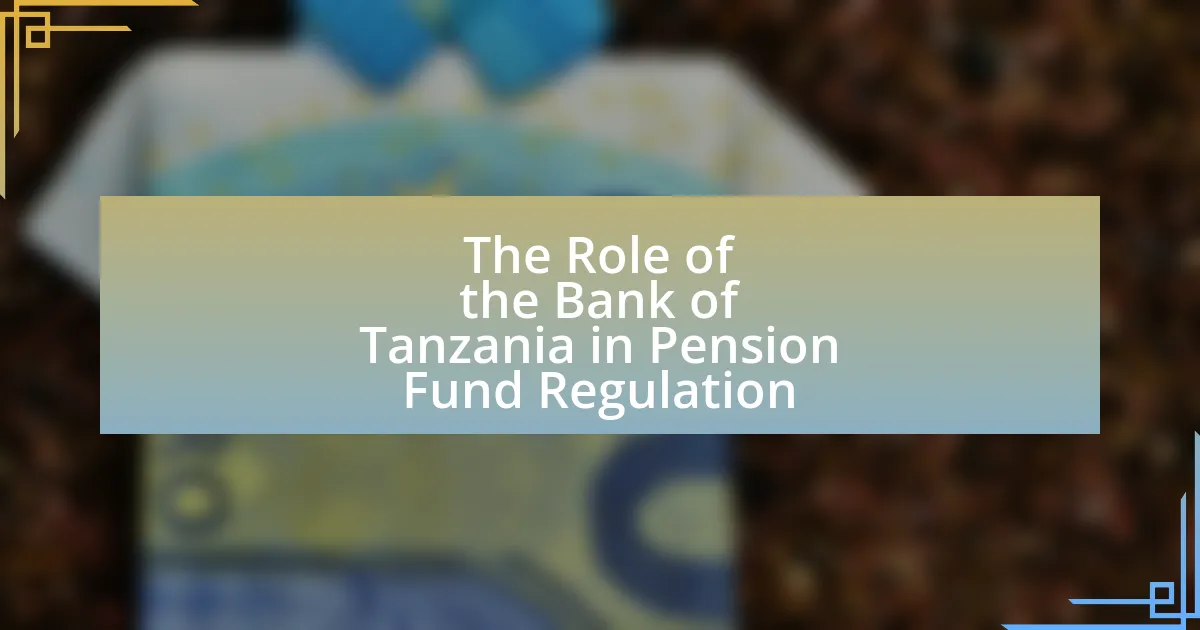The article examines the impact of international standards on local pension fund regulations in Tanzania, highlighting the influence of frameworks such as the International Financial Reporting Standards (IFRS) and guidelines from the International Organization of Pension Supervisors (IOPS). It discusses how these standards enhance governance, risk management, and transparency within pension funds, ultimately fostering investor confidence and attracting foreign investment. The article also addresses the current state of pension fund regulations in Tanzania, recent reforms aimed at aligning local practices with international expectations, and the challenges faced in implementing these standards. Additionally, it outlines best practices for compliance and the potential long-term benefits of adopting international standards for the sustainability and efficiency of pension funds in Tanzania.

How do International Standards Impact Local Pension Fund Regulations in Tanzania?
International standards significantly influence local pension fund regulations in Tanzania by providing a framework for governance, risk management, and investment practices. These standards, such as those set by the International Organization for Standardization (ISO) and the International Financial Reporting Standards (IFRS), guide Tanzanian regulators in enhancing transparency, accountability, and efficiency within pension funds. For instance, the adoption of IFRS has led to improved financial reporting and risk assessment practices among pension funds, aligning them with global best practices. This alignment not only fosters investor confidence but also attracts foreign investment, thereby strengthening the local pension sector.
What are the key international standards relevant to pension funds?
The key international standards relevant to pension funds include the International Financial Reporting Standards (IFRS), the International Organization of Pension Supervisors (IOPS) guidelines, and the OECD Principles of Private Pension Regulation. IFRS provides a framework for financial reporting, ensuring transparency and comparability in pension fund financial statements. The IOPS guidelines focus on effective supervision and regulation of pension funds, promoting sound governance and risk management practices. The OECD Principles offer a comprehensive set of recommendations for the regulation and supervision of private pension systems, emphasizing the importance of protecting beneficiaries’ interests and ensuring the sustainability of pension schemes. These standards collectively influence local pension fund regulations, including those in Tanzania, by establishing benchmarks for governance, financial reporting, and supervisory practices.
How do these standards define pension fund governance?
International standards define pension fund governance as a framework that ensures accountability, transparency, and effective management of pension funds. These standards typically outline the roles and responsibilities of governing bodies, emphasizing the need for a clear structure that includes oversight mechanisms, risk management practices, and compliance with legal and regulatory requirements. For instance, the International Organization of Pension Supervisors (IOPS) provides guidelines that stress the importance of fiduciary duty, requiring pension fund managers to act in the best interests of beneficiaries, thereby reinforcing trust and integrity in the management of pension assets.
What role do international accounting standards play in pension fund reporting?
International accounting standards provide a framework for pension fund reporting, ensuring consistency, transparency, and comparability across financial statements. These standards, such as the International Financial Reporting Standards (IFRS), require pension funds to recognize and measure their obligations and assets accurately, which enhances the reliability of financial information. For instance, IFRS 19 mandates the recognition of defined benefit obligations and the fair value measurement of plan assets, which directly impacts how pension funds report their financial health. This adherence to international standards helps local pension funds in Tanzania align with global best practices, thereby improving investor confidence and regulatory compliance.
Why are international standards important for local pension fund regulations?
International standards are crucial for local pension fund regulations because they ensure consistency, transparency, and accountability across different jurisdictions. These standards provide a framework that local regulators can adopt to enhance the stability and reliability of pension systems. For instance, adherence to the International Financial Reporting Standards (IFRS) allows pension funds to present their financial statements in a comparable manner, which is essential for attracting both local and foreign investments. Furthermore, the International Organization of Pension Supervisors (IOPS) offers guidelines that help local regulators improve their supervisory practices, thereby reducing risks associated with pension fund management. This alignment with international standards ultimately fosters trust among stakeholders and promotes the long-term sustainability of pension funds.
How do these standards enhance transparency and accountability?
International standards enhance transparency and accountability in local pension fund regulations by establishing clear guidelines and benchmarks for governance and reporting. These standards require pension funds to disclose financial information, investment strategies, and risk management practices, which allows stakeholders to assess the funds’ performance and integrity. For instance, adherence to the International Financial Reporting Standards (IFRS) mandates that pension funds provide comprehensive financial statements, promoting clarity and comparability. This transparency fosters trust among beneficiaries and regulators, as it enables informed decision-making and oversight, ultimately leading to improved accountability in fund management.
What risks do local pension funds face without adherence to international standards?
Local pension funds face significant risks without adherence to international standards, including financial mismanagement, regulatory non-compliance, and increased vulnerability to fraud. Financial mismanagement can arise from a lack of transparency and accountability, leading to poor investment decisions that jeopardize fund sustainability. Regulatory non-compliance exposes pension funds to legal penalties and loss of credibility, which can deter potential investors. Furthermore, without robust international standards, local pension funds may lack the necessary frameworks to detect and prevent fraudulent activities, increasing the risk of financial losses. These risks are underscored by the fact that countries with stringent adherence to international standards, such as those set by the International Organization of Pension Supervisors, often report better fund performance and lower incidences of fraud.

What is the current state of pension fund regulations in Tanzania?
The current state of pension fund regulations in Tanzania is characterized by ongoing reforms aimed at enhancing the efficiency and sustainability of pension schemes. The National Social Security Fund (NSSF) and the Public Service Pensions Fund (PSPF) are the primary institutions governing pension funds, and they are subject to the Pension Act of 2012, which aligns with international standards set by the International Labour Organization (ILO). Recent amendments have focused on improving governance, increasing coverage, and ensuring better investment strategies to protect beneficiaries’ interests. These reforms are supported by the Financial Sector Deepening Trust (FSDT), which emphasizes the importance of regulatory frameworks that adhere to global best practices.
How do local regulations align with international standards?
Local regulations in Tanzania align with international standards through the adoption of guidelines set by organizations such as the International Organization for Standardization (ISO) and the International Financial Reporting Standards (IFRS). These frameworks provide a benchmark for governance, transparency, and accountability in pension fund management. For instance, Tanzania’s Pension Act incorporates principles from the International Labour Organization (ILO) conventions, ensuring that local practices meet global expectations for worker protection and pension security. This alignment is further evidenced by Tanzania’s commitment to the Sustainable Development Goals (SDGs), which emphasize the importance of sustainable and inclusive financial systems.
What are the gaps between local regulations and international expectations?
The gaps between local regulations and international expectations in Tanzania’s pension fund sector include insufficient alignment with global best practices, lack of transparency, and inadequate risk management frameworks. For instance, while international standards advocate for robust governance structures and comprehensive reporting, local regulations often fall short in enforcing these measures, leading to potential mismanagement of funds. Additionally, the International Labour Organization emphasizes the importance of member protection and benefit adequacy, yet local regulations may not fully address these aspects, resulting in lower retirement security for beneficiaries. This misalignment can hinder the effectiveness of pension funds in meeting the needs of the population, as highlighted by the World Bank’s assessment of pension systems in developing countries, which points out that many local frameworks do not adequately reflect the evolving international standards necessary for sustainable pension management.
How have recent reforms in Tanzania addressed these gaps?
Recent reforms in Tanzania have addressed gaps in pension fund regulations by aligning local laws with international standards, particularly through the implementation of the Pension Reform Act of 2018. This act introduced measures to enhance transparency, governance, and financial sustainability of pension funds. For instance, it mandated regular audits and reporting requirements, which improve accountability and protect beneficiaries’ interests. Additionally, the reforms have facilitated the establishment of a regulatory framework that encourages private sector participation, thereby increasing the overall coverage and efficiency of pension schemes. These changes are supported by data indicating a rise in pension fund membership and improved financial performance since the reforms were enacted.
What challenges do local pension funds face in implementing international standards?
Local pension funds in Tanzania face several challenges in implementing international standards, primarily due to regulatory discrepancies, limited resources, and lack of expertise. Regulatory discrepancies arise when local laws and practices do not align with international standards, creating confusion and compliance difficulties. Limited resources hinder the ability of these funds to invest in necessary technology and training to meet international benchmarks. Additionally, a lack of expertise among local fund managers and staff can impede the effective adoption of complex international standards, as evidenced by a 2021 report from the World Bank highlighting the skills gap in the Tanzanian financial sector. These challenges collectively restrict the ability of local pension funds to fully comply with international standards, impacting their operational efficiency and governance.
How do cultural and economic factors influence compliance?
Cultural and economic factors significantly influence compliance by shaping the attitudes and behaviors of individuals and organizations towards regulations. In Tanzania, cultural norms, such as communal values and trust in local institutions, can enhance compliance with pension fund regulations, as individuals may prioritize collective well-being over individual gain. Conversely, economic factors, including the level of economic development and financial literacy, can either facilitate or hinder compliance; for instance, a higher economic status often correlates with better understanding and adherence to regulations. Research indicates that in developing countries, compliance is often affected by the perceived legitimacy of regulations, which is influenced by cultural acceptance and economic incentives.
What resources are available to assist local funds in meeting these standards?
Local funds in Tanzania can access various resources to meet international standards, including technical assistance from international organizations, training programs, and regulatory frameworks. Organizations such as the International Labour Organization (ILO) and the World Bank provide guidelines and support for pension fund management. Additionally, local regulatory bodies, like the Pension Funds Regulatory Authority (PFRA), offer resources and training to ensure compliance with international best practices. These resources are essential for enhancing the governance, transparency, and sustainability of local pension funds, aligning them with global standards.

How can local pension funds effectively integrate international standards?
Local pension funds can effectively integrate international standards by adopting best practices in governance, risk management, and investment strategies that align with global benchmarks. This integration involves aligning local regulations with frameworks such as the International Financial Reporting Standards (IFRS) and the Principles for Responsible Investment (PRI), which enhance transparency and accountability. For instance, the adoption of IFRS can improve financial reporting quality, making it easier for local pension funds to attract international investors. Additionally, implementing the PRI can guide funds in incorporating environmental, social, and governance (ESG) factors into their investment decisions, which is increasingly recognized as a standard in global finance. By following these international frameworks, local pension funds in Tanzania can enhance their operational efficiency and competitiveness on a global scale.
What best practices can local pension funds adopt for compliance?
Local pension funds can adopt several best practices for compliance, including implementing robust governance frameworks, conducting regular audits, and ensuring transparency in financial reporting. Establishing a governance framework that aligns with international standards, such as the OECD Principles of Corporate Governance, helps ensure accountability and effective oversight. Regular audits, both internal and external, are essential for identifying compliance gaps and ensuring adherence to regulations. Furthermore, maintaining transparency in financial reporting, as recommended by the International Financial Reporting Standards (IFRS), fosters trust and accountability among stakeholders. These practices not only enhance compliance but also align local pension funds with global standards, thereby improving their operational integrity and stakeholder confidence.
How can technology facilitate adherence to international standards?
Technology can facilitate adherence to international standards by providing tools for compliance monitoring, data management, and reporting. For instance, software solutions can automate the tracking of regulatory requirements, ensuring that pension funds in Tanzania align with international benchmarks. Additionally, digital platforms enable real-time data analysis, which helps organizations identify gaps in compliance and implement corrective actions swiftly. Research indicates that organizations utilizing technology for compliance reporting experience a 30% reduction in non-compliance incidents, demonstrating the effectiveness of these tools in maintaining adherence to international standards.
What training and education are necessary for fund managers and regulators?
Fund managers and regulators typically require a combination of formal education and specialized training in finance, economics, or related fields. A bachelor’s degree in finance, business administration, or economics is often essential, while many fund managers pursue advanced degrees such as an MBA or a master’s in finance to enhance their expertise. Additionally, certifications like the Chartered Financial Analyst (CFA) designation are highly regarded in the industry, providing in-depth knowledge of investment analysis and portfolio management.
Regulators, on the other hand, may benefit from a background in law, public policy, or economics, along with training specific to financial regulations and compliance. Continuous professional development through workshops and seminars on evolving financial regulations is also crucial for both fund managers and regulators to stay updated with international standards and local regulatory changes.
What are the potential benefits of aligning with international standards?
Aligning with international standards offers several potential benefits, including enhanced credibility, improved operational efficiency, and increased market access. Organizations that adhere to these standards often gain trust from stakeholders, as compliance signals a commitment to quality and reliability. For instance, companies that align with the International Organization for Standardization (ISO) standards can experience a 20% increase in customer satisfaction, according to a study by the ISO. Furthermore, aligning with international standards can streamline processes, reduce costs, and facilitate trade by meeting global requirements, thereby expanding market opportunities.
How can improved compliance enhance investor confidence in Tanzanian pension funds?
Improved compliance can enhance investor confidence in Tanzanian pension funds by ensuring that these funds adhere to international standards and regulations, which promotes transparency and accountability. When pension funds comply with established guidelines, they demonstrate a commitment to safeguarding investors’ assets and managing risks effectively. For instance, adherence to the International Financial Reporting Standards (IFRS) can provide investors with reliable financial statements, thereby increasing trust in the fund’s financial health. Additionally, compliance with the Pension Funds Act in Tanzania, which mandates regular audits and disclosures, can further reassure investors that their investments are being managed prudently and ethically. This alignment with international best practices not only mitigates risks but also attracts foreign investment, as investors are more likely to engage with funds that exhibit strong governance and regulatory adherence.
What long-term impacts can be expected from adopting these standards?
Adopting international standards in Tanzania’s pension fund regulations can lead to enhanced financial stability and improved governance. These standards promote transparency and accountability, which can attract foreign investment and increase public trust in pension systems. For instance, countries that have implemented similar standards, such as those in the European Union, have seen a significant reduction in fraud and mismanagement, leading to a more robust pension framework. Additionally, adherence to these standards can facilitate better risk management practices, ultimately resulting in higher returns for pension fund beneficiaries over the long term.
What practical steps can local pension funds take to align with international standards?
Local pension funds can align with international standards by adopting best practices in governance, risk management, and investment strategies. Implementing a robust governance framework that includes independent oversight and transparency ensures accountability, which is a key aspect of international standards. Additionally, local pension funds should enhance their risk management processes by incorporating international risk assessment methodologies, such as those outlined by the International Organization of Pension Supervisors (IOPS). Furthermore, adopting diversified investment strategies that comply with global asset allocation norms can improve performance and sustainability. Evidence from the OECD suggests that pension funds adhering to these practices tend to achieve better long-term outcomes, thereby validating the effectiveness of these steps.





